THE WRECK OF THE MOHEGAN.' T HE wreck of the great
liner, the Mohegan,' the most impressive tragedy of the year, is, we can hardly doubt, one more proof of the old truth, upon which we have so often insisted, that human skill cannot eliminate the personal equation from the course of any human arrangement. The cause of the wreck is still, in part, a mystery, and must remain so, for the only men who could have cleared it up by direct testimony were drowned with the ill-fated vessel; bat all the circumstantial evidence points one way, and we do not fancy the experts are so doubtful as they deem it right to appear. The Captain must have been the cause, though prob- ably not the blameable cause, of the catastrophe. Look at the facts. The vessel was almost new, she had been thoroughly surveyed before she started, her machinery was in good order, and up to the moment of her destruction it did its work only too well. There is not the slightest evidence that the compasses, which had just been tested by a professional examiner, were out of order, or that the men at the wheel were in any way incompetent for their function. If they had been, the officers would have detected it at once. The night hacl only just fallen, and was so clear that men on deck saw the Manacle rocks close to them, and men on shore fired rockets because they thought they saw the `Mohegan ' running into danger. Yet the vessel was from ten to fifteen miles oat of her course, she was steering in a wrong direotion, and she was, by the testimony of all witnesses, run straight -.Ton the rocks. She was at the time in charge of the 'Captain, for, as the agent of the company said, no one but the Captain would have taken the responsibility of directing her on the course in which she was directed. 'The Captain, again, was a man of unusual experience, who must have known the sea-road as well as any West London cabman knows the Strand, who was Commodore of a whole fleet of liners, and who was acknowledged by his comrades to be the best and most abstemious officer among -them. No one has even a critical word for Captain Griffiths. The inference is inevitable. Captain Griffiths either intended to wreck his vessel—which is impossible and absurd, and which we mention only to exhaust the theories—or his mind for some unknown reason, some overwhelming grief, or thought, or preoccupation, or it may be some halluci- nation as to the point he had reached, had temporarily failed him, and he gave orders the import of which he did not per- ceive The moment the catastrophe had occurred he was himself again, a calm, resolved officer who gave the right orders clearly, who was obeyed by his men to the last moment, and who inspired such confidence that, as all the witnesses testify, under the horrible circumstances, with the lights all out, and the women on board screaming so that they were heard four miles away, with immediate death staring everybody in the face, there was no panic. He made no effort to save himself till he had done his duty to the last, and then he failed, and was drowned like any passenger. Subject always to fresh evidence, which is conceivable though improbable, we can hardly doubt that this is the explanation, as it is the explanation of many another catastrophe. Tne Captain, or the General, or the engine-driver "loses his head," not through drink, or from cowardice, or by reason of incompetence, but from a temporary failure of brain-power, akin to the momentary failure of power which will sometimes paralyse a man's limbs. The 'Captain mistakes a sea-road which he knows as well as the way to his cabin, the General forgets utterly some cardinal piece of information or topographical fact, the engine-driver does not see the signal which should stop him, the catastrophe occurs, and no one of the three, if he survives, can ever re- member clearly what it was went wrong. Observers rack their brains for explanations, but if the matter had been less serious they would have been at no loss to understand. They would perceive, and probably say, that the man who com- mitted the blunder had "lost his head," and if old men, would probably recall some occasion on which a similar visitation had happened to themselves, and they had said something, or done something, or forgotten something in a way for which they c ould not in the least account. Usually it is a tired brain which has given out, but intense anxiety will produce the same effect, so will excessive absorption in one subject, and sometimes there is no explanation at all, a truth of which gre Lt chess-players, among others, are curiously well aware. T ,ey, especially if they are very experienced, occasionally make moves which they are ready to swear with perfect 'truth they had no intention of making, but made in what the Scotch would describe as a momentary " dwana.', In his last terrible campaign, within his own frontier, Napoleon is said to have betrayed once or twice a suspension of faculties, a positive incapacity to give orders, which was the despair of his Staff, and led to wild legends about drink
and epilepsy. His mind had struck work, that was all, and if forced to work, worked wrong. There is an even better
illustration in an older historic story, at least as we read it. Henry II., the Valois King of France, was hunting in 'Vincennes. He was one of the most cunning and secre- tive of men, but he suddenly, without provocation or reason, turned to the Prince of Orange, a mere guest, not even hi8 own subject, whom he had no reason to trust, and revealed a monstrous secret, his agreement with Philip of Spain to end all heresy by a complete massacre of all heretics. That revelation changed European history, and was, we believe, simply a spill-over of a mind too full and too small to hold the monstrous plan which it contained. Neither Henry nor William ever knew why that secret was revealed. There is scarcely an experienced man in a great position in civil life to whom the same thing has not happened, though he has usually been able by resting, or sleeping, or remaining passive to prevent any evil consequences.
It is this personal equation which renders it so hopeless to dream of ever preventing occasional great accidents. There are no automata—clocks are nearest—which do anything continuously without human aid. You cannot make a machine-mind. Do what you will, expend what ingenuity you may, and there is still a point at which the great machine—ironclad, or army, or railway, or bureau—is de- pendent for something on a human mind, and that mind, pick it how you like, train it how you will, cannot be relieved of its liability to stoppage or to error. The man is tired, or sleepy, or momentarily forgetful, or absorbed, something is neglected, and in a moment there is a catastrophe the extent of which is measured by the greatness of the machine. Usually such catastrophes are too insignificant for notice because the machine is' small ; but every now and then, because it is big, they shock and amaze the world. There is no remedy except a division of responsibility, a necessity for consultation in all crises, which human experience has demonstrated to be fatal to efficiency. The Committee-Captain never furls the sails in time for the squall; the Committee-General will not fight, or fighting, gives no orders, or contradictory orders ; the Committee- engine-driver—but that, happily, is inconceivable. Men mast just bear the risk with fortitude, as they bear a hundred other risks "inherent in the nature of things," or, as we should prefer to put it, the result of laws of which we know neither the nature nor the object,—know nothing, in fact, except that they must help to the fulfilment of some adequate though invisible purpose. Purpose ? In all that massacre scattering pain among the innocent ? Yes, most decidedly, unless the materialists are right ; and that they are wrong we know no better proof than the total failure of mechanical science to exempt machines from their ultimate dependence upon mind. Make your vessel the most marvellous of structures, but if her Captain is momentarily confused for any reason, and fails to distinguish between the Manacles and the Lizard, the marvel of her structure will not save her or her passengers from instantaneous ruin.











































 Previous page
Previous page